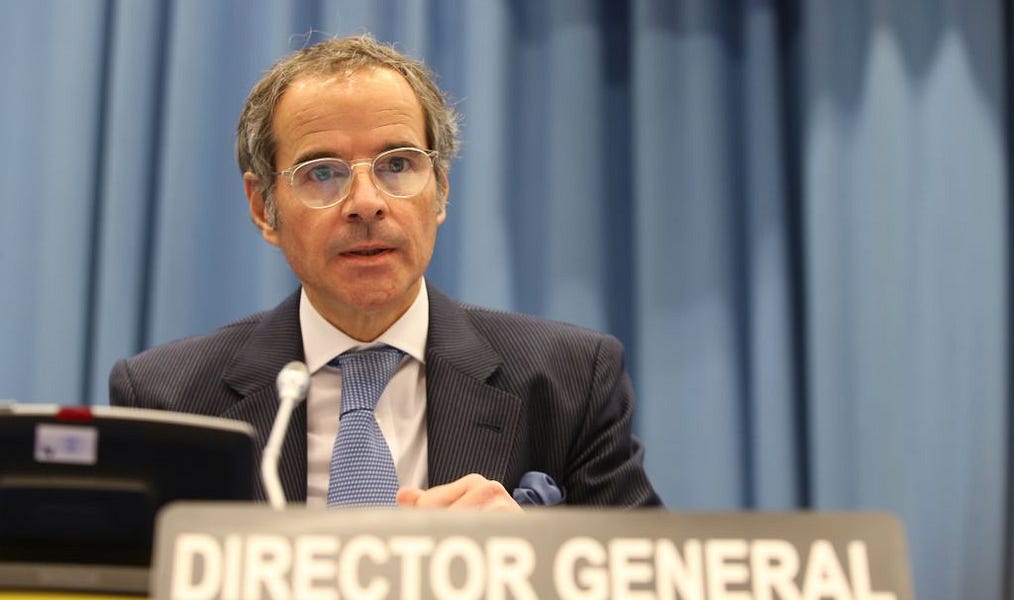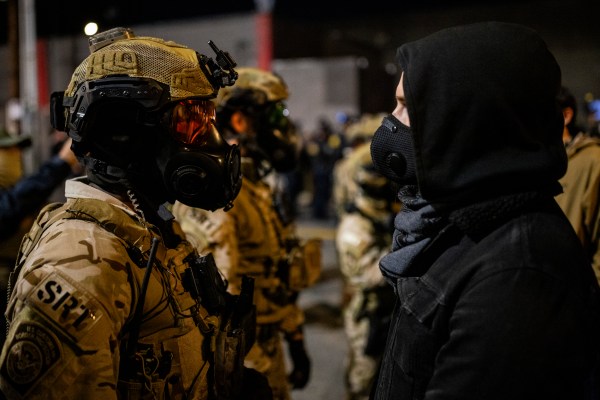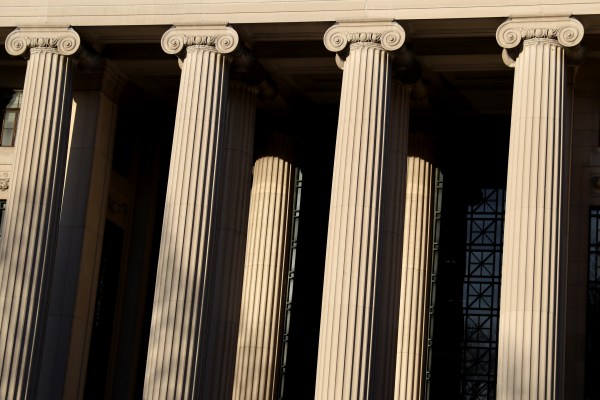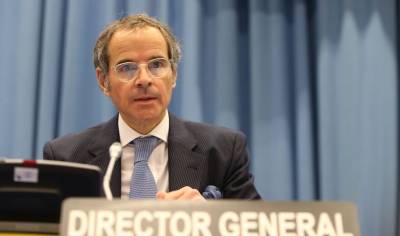The International Atomic Energy Agency’s (IAEA) Board of Governors will meet next week in Vienna to consider a new assessment from the U.N. agency’s chief nuclear watchdog that suggests Iran is concealing undeclared nuclear sites and material in violation of the Nuclear Non-Proliferation Treaty (NPT). The United States and the rest of the 35-nation board should respond forcefully—rejecting any sanctions relief for the world’s leading state sponsor of terrorism until Tehran submits to a complete and verifiable accounting of all its nuclear activities.
In addition to the latest stunning report from IAEA Director General Rafael Grossi, the agency’s upcoming board meeting takes place against the backdrop of last week’s shocking revelation by the Wall Street Journal that Iran obtained confidential files outlining what the U.N. agency knew about Tehran’s clandestine nuclear weapons program. Iran then used that information to develop false but plausible narratives to deceive inspectors. This mendacity mirrors revelations in Iran’s secret nuclear archive, part of which Israel’s Mossad seized from a Tehran warehouse in early 2018, that document Tehran’s orders to falsify records and conceal the regime’s work on nuclear weapons.
The Journal’s newly discovered documents, like the archive, underscore two basic truths. First, Iran was violating the 2015 nuclear deal, formally known as the Joint Comprehensive Plan of Action (JCPOA), from the very start by hiding its nuclear weapons-related activities and sites from what was supposed to be the most intrusive verification regime in history. Second, while the JCPOA had many fatal flaws, including allowing Iran to retain a domestic enrichment program alongside expiration dates on clauses banning key nuclear activities, its most fundamental failing was allowing any deal to proceed without first obtaining a complete and verifiable accounting of all the Islamic Republic’s past and present nuclear activities—especially the program’s possible military dimensions.
The archive led the IAEA to discover at least four previously unknown sites, including three where inspectors found traces of man-altered uranium—likely sourced to Iran’s work to develop and test its military nuclear program. Parties to the NPT are required to declare nuclear material and activities to the IAEA, and the agency’s findings could lead its Board of Governors to declare Iran in non-compliance with its treaty obligations. The board’s pronouncement would mark the first political step in forwarding the file to the U.N. Security Council, which could then reimpose international sanctions.
When Israel first exposed Iran’s nuclear archive, supporters of the nuclear deal downplayed its significance, arguing it merely contained details of a nuclear weapons program that no longer exists—that it was nothing but a historical record of a program abandoned in 2003. But the discovery of uranium particles at the undeclared sites, where commercial satellite imagery also showed recent efforts to destroy buildings and dig out contaminated dirt, suggests an ongoing concealment campaign—one that has led the IAEA’s top watchdog to repeatedly sound an alarm. And as the Journal’s recent report demonstrates, Iran’s sophisticated cheating machine is years in the making.
In March, IAEA Director General Rafael Grossi announced he would give Iran one last chance to explain how seemingly undeclared nuclear material showed up at undeclared nuclear sites—with an eye toward presenting his conclusions at the agency’s June board meeting. Grossi on Monday reportedly circulated his findings to the board, stating that despite “numerous opportunities” to do so, “Iran has not provided explanations that are technically credible. Nor has Iran informed the Agency of the current location(s) of the nuclear material and/or equipment contaminated with nuclear material.”
Barring an unexpected outpouring of transparency and forthrightness by Iran’s supreme leader, Ayatollah Ali Khamenei, Grossi’s report next week should give the IAEA board a choice. It can either defend the integrity of the NPT or sacrifice the backbone of the international nonproliferation regime for the sake of a political agreement that tacitly accepts the concealment of nuclear work, ignores Iran’s ongoing deception, and otherwise provides little nonproliferation value.
In 2015, Grossi’s predecessor, the late Yukiya Amano, left a permanent stain on the IAEA when he allowed Iran to stonewall the agency’s requests, pursuant to the JCPOA, for access to key nuclear personnel and records. Weeks later, under American and European pressure, Amano issued a report whitewashing questions about the past military dimensions of Iran’s nuclear program—the JCPOA’s key predicate for lifting sanctions on the Islamic Republic.
Now, seven years later, with President Joe Biden eyeing a revival of the JCPOA, Grossi has refused to buckle under similar pressure. He has all but declared Iran in violation of its Comprehensive Safeguards Agreement and the NPT. The onus to demand transparency and accountability now shifts to Grossi’s board. The ball is in Biden’s court.
If Iran conducted undeclared nuclear weapons work at several sites, the IAEA board would be wise to ask where the associated materials and equipment are stored today. The board should also ask whether Iran has concealed other sites from the agency. How, after all, can any nuclear deal fully verify that Iran’s nuclear program is peaceful without a full accounting of all past and present activities?
Grossi has undoubtedly asked these questions of Iran since he replaced Amano in 2019. But without any pressure from his board of governors, the U.N. Security Council, or individual member states, Iran has no incentive to cooperate with the IAEA’s safeguards investigation. Last week, U.S. Special Envoy for Iran Robert Malley told the Senate Foreign Relations Committee that prospects for reaching a deal with Tehran were now “tenuous at best,” following President Biden’s decision to reject Iran’s request to remove the Islamic Revolutionary Guard Corps from the State Department’s Foreign Terrorist Organization list.
That’s welcome news. After all, Grossi had already warned there could be no genuine return to the 2015 accord due to Iran’s irreversible gain of technical knowledge on advanced centrifuges. “You cannot put the genie back into the bottle,” Grossi said last year.
President Biden avoided making a massive strategic mistake by keeping the IRGC on America’s terror list. He can avoid another by defending the IAEA and the NPT—by delivering consequences to a rogue regime that breaches its international treaty obligations.
Jacob Nagel is a senior fellow at the Foundation for Defense of Democracies (FDD) and a visiting professor at the Technion Aerospace faculty. He previously served as acting national security adviser to Prime Minister Benjamin Netanyahu and as head of the National Security Council. Richard Goldberg is a senior advisor at the Foundation for Defense of Democracies. He previously served as the White House National Security Council’s director for countering Iranian weapons of mass destruction, and as the lead Senate Republican negotiator for several rounds of congressionally enacted sanctions against Iran.






Please note that we at The Dispatch hold ourselves, our work, and our commenters to a higher standard than other places on the internet. We welcome comments that foster genuine debate or discussion—including comments critical of us or our work—but responses that include ad hominem attacks on fellow Dispatch members or are intended to stoke fear and anger may be moderated.
With your membership, you only have the ability to comment on The Morning Dispatch articles. Consider upgrading to join the conversation everywhere.